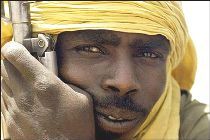Rebels to attend Darfur peace talks, want their demands implemented
By NADIA ABOU EL-MAGD, Associated Press Writer
CAIRO, Egypt, Aug 19, 2004 (AP) — Rebels from the western Sudanese region of Darfur will go to peace negotiations in Nigeria demanding that militias accused of atrocities be disarmed and those responsible for committing crimes against civilians be tried, a spokesman told The Associated Press Thursday.
 Adam Ali Shogar, a spokesman of the Sudan Liberation Army, said in a telephone interview with The Associated Press that those and other demands to be presented in Abuja, Nigeria, are the same points raised by the rebels in previous negotiations with the Sudanese government.
Adam Ali Shogar, a spokesman of the Sudan Liberation Army, said in a telephone interview with The Associated Press that those and other demands to be presented in Abuja, Nigeria, are the same points raised by the rebels in previous negotiations with the Sudanese government.
He said the demands had been spelled out in a little-respected cease-fire agreement worked out at April talks hosted by Chad’s government in hopes of resolving what the United Nations calls the world’s worst humanitarian crisis.
“These demands are a test of the credibility of the government in reaching a peaceful solution, and a test of its good intentions, because we feel that the government, since it has signed this agreement, hasn’t implemented a single item,” Shogar said.
Shogar said other demands include opening safe passage for aid workers and halting military operations against civilians.
Shogar’s Sudan Liberation Army and the Justice and Equality Movement launched their rebellion in February 2003 after years of low-level clashes between ethnic African farmers and ethnic Arab herders over the region’s scarce water and arable land. The rebels, drawn from African tribes, accused the government of favoring the nomadic Arab tribes.
Human rights groups, the U.S. Congress and U.N. officials accuse Sudan’s government of responding to the rebellion by backing a scorched-earth offensive by Arab militias, known as the Janjaweed. Some estimates put the toll in Darfur at 30,000 dead and more than a million people displaced.
The government denies it backs the Janjaweed, blames the violence on the rebels and says descriptions of the violence has been exaggerated.
In his capacity as chairman of the African Union, Nigerian President Olusegun Obasanjo offered to host negotiations between the Sudanese government and the two rebel groups starting Monday. The rebels walked out of previous talks July 17, accusing the government of ignoring existing peace agreements.
Sudanese Foreign Minister Mustafa Osman Ismail, whose government has agreed to attend the Nigeria meeting, has blamed the failure of negotiations on “impossible and changing conditions” set by the rebels.
The government has said it can restore calm with international help and says it has started to disarm the Janjaweed and bring some of its members to trial.
Shogar, the rebel spokesman, charged that rather than cracking down on the militia, the government is bringing Janjaweed fighters into the police, army and other security forces. Human rights groups previously made the same accusation.
Shogar said his movement was in close coordination with the Justice and Equality Movement and both groups would send representatives to the Nigeria talks. Repeated calls to Justice and Equality Movement officials went unanswered.
In Nigeria, the Nigerian senate voted Thursday to authorize sending troops to Darfur as part of an African Union force that is guarding truce monitors.
The African Union has asked for 120 Nigerian soldiers to join troops from Rwanda, but the senate approved the deployment of up to 1,500 soldiers in case more help is asked for.
